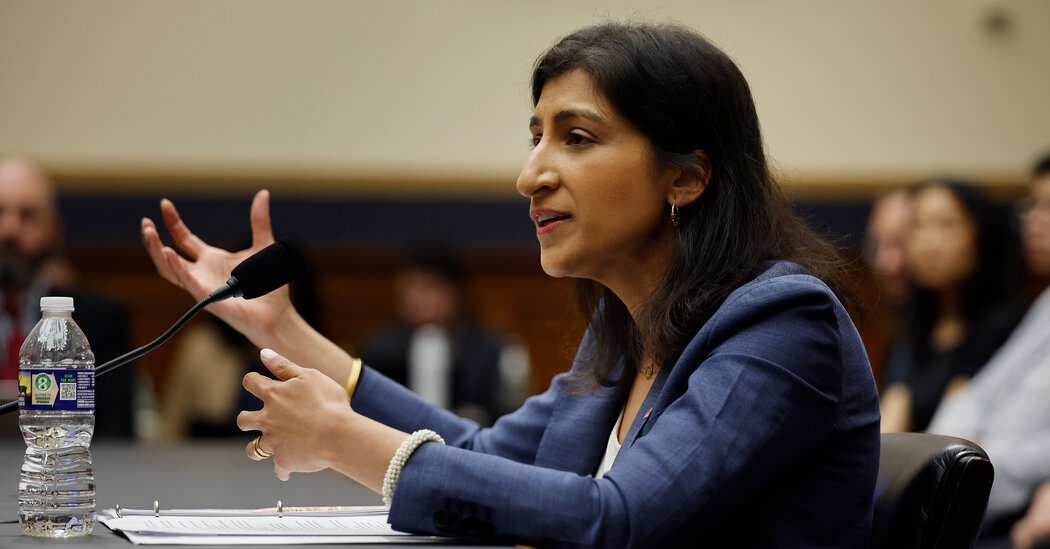The Federal Trade Commission on Tuesday sharply criticized pharmacy benefit managers, saying in a scathing 71-page report that “these powerful middlemen may be profiting by inflating drug costs and squeezing Main Street pharmacies.”
The regulator’s study signals a significant ramping up of its scrutiny of benefit managers under the agency’s chair, Lina Khan. It represents a remarkable turnabout for an agency that has long taken a hands-off approach to policing these companies.
The F.T.C. has so far stopped short of bringing a lawsuit or other enforcement action against a benefit manager. But the industry fears that the report could lead to a formal investigation into its practices or to a lawsuit accusing benefit managers of anticompetitive conduct. The agency’s findings could also fuel legislative efforts in Congress and in the states to impose limits on the industry.
The three largest benefit managers — CVS Health’s Caremark, Cigna’s Express Scripts and UnitedHealth Group’s Optum Rx — collectively process roughly 80 percent of prescriptions in the United States. Hired by employers and government health insurance programs like Medicare, benefit managers are responsible for negotiating prices with drug makers, paying pharmacies and helping decide which drugs are available and at what cost to patients.
Benefit managers are supposed to save everyone money. But in recent years, the industry has grown more consolidated and has taken more control over how patients get their medicines, in a shift that critics say contributes to driving up drug costs.
In a statement on Tuesday, Ms. Khan said the agency’s inquiry had shown “how dominant pharmacy benefit managers can hike the cost of drugs — including overcharging patients for cancer drugs.” She went on to say that the agency found evidence of “how P.B.M.s can squeeze independent pharmacies that many Americans — especially those in rural communities — depend on for essential care.”
Benefit managers defend their business practices, saying they save money for employers, governments and patients. They say that their scale gives them crucial leverage to take on the real culprit of high drug prices, pharmaceutical companies. And they say they are simply being frugal with their clients’ money when they pay outside pharmacies low rates to reimburse them for buying and dispensing medications.
“In fact, the market for pharmacy benefit companies is dynamic, diverse and has only become even more competitive,” the industry’s main lobbying group said in a statement last year.
The F.T.C.’s report detailed an array of ways that benefit managers appeared to be inflating the cost of prescription drugs. For example, it pointed to an important line of business — the companies’ affiliated pharmacies, including warehouse-based operations that send prescriptions through the mail to patients. The agency examined two generic cancer drugs and found that benefit managers often paid their own pharmacies much more than it would cost to buy those drugs from a wholesaler. The practice translated into nearly $1.6 billion in revenue over less than three years for the biggest three conglomerates, according to the report.
The agency also zeroed in on the benefit managers’ role in deals intended to block competition in favor of a single product. These are arrangements in which a drug maker pays a large discount, handled by the benefit manager and passed back to the employer, in exchange for restrictions that push the drug company’s product to patients, while discouraging similar and potentially cheaper products. The report suggested that this practice may be illegal because it thwarts competition.
The F.T.C. has historically given benefit managers the benefit of the doubt, because it viewed their mission of lowering drug prices as good for consumers. The agency waved through a series of mergers, saying in 2012 that there was robust competition.
The benefit managers have “done a very skillful job in avoiding regulation,” said David Balto, an antitrust lawyer in Washington who worked at the commission during the Clinton administration and is a sharp critic of the intermediary companies.
Over the past decade, the top three benefit managers steadily gained more market share. By the end of 2018, each had become part of the same company as a giant insurer. Critics said that corporate structure created an uneven playing field that squeezed out smaller competitors. The Trump and Biden administrations each became more skeptical about whether patients were benefiting.
Under the leadership of Ms. Khan, who became chair in 2021, the F.T.C. made clear that it was looking closely at benefit managers and other big corporations.
With a more expansive view of anticompetitive harm than her predecessors, Ms. Khan has been aggressive in taking on big business across industries including tech, supermarkets and pharma. Her efforts to block corporate mergers have generated mixed results and criticism that she is overstepping her authority.
In a 2022 speech, Ms. Khan said that the benefit managers were “wielding extraordinary influence that can have life-and-death consequences,” while also “being extraordinarily opaque and complex.” That, she said, “is a combination that’s always worth scrutinizing.”
